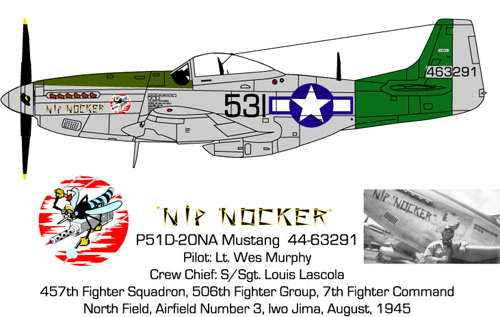Pilot: Wes Murphey | Nickname: ? | Rank: ? | Squadron: ? | Plane: 538 | Name: Nip Nocker| S/N: 463291

|
A World War II-era P-47 Thunderbolt fighter plane crash lands in a boundless swamp on a routine flight out of Wilmington. For the next 52 years it sprawls there, damaged and vandalized, but still able to inspire reports of downed aircraft from alarmed passing pilots.
News stories recounted the fighter pilot's rescue by a team of volunteers who hacked through underbrush for 24 hours to reach him, but mysteriously the pilot's name remained obscured in the muck of time and military secrecy.
One day while talking with his friend and fellow aviation enthusiast Mike Stowe about Thunderbolts, Stowe said, "You know, there's one down in the Green Swamp down there" in North Carolina.
Further research into those accident reports spurred Ferris to begin a quest in 1995 for information about a P-47B Thunderbolt fighter plane that bore the serial number 41-5920. His research revealed that the P-47B rusting away in the Green Swamp was the 30th of its kind to roll off the assembly line and, more importantly, the oldest surviving Thunderbolt in the world.
His desire for more information about the Thunderbolt led Ferris to make a phone a call a few years later to a retired Federal Aviation Administration employee living in Lincoln, Neb. The man, in his late 70s, flew fighter planes – P-39s and P-51 Mustangs during World War II before settling into the tamer life of government service.
The man, Wesley A. Murphey Jr., it turns out, was the pilot flying the P-47B Thunderbolt 41-5920 the evening it crash landed in the Green Swamp.
Flames and a forced landing
Twenty-six-year-old 2nd Lt. Murphey was ferrying the P-47 Thunderbolt fighter plane on Jan. 5, 1944, from Wilmington's Bluethenthal Field to Fort Myers, Fla., when trouble started and a legend was born.
Murphey took off about 5 p.m. that Wednesday evening. He was in the air for only 10 minutes, but he was already 25 miles southwest of Wilmington and over the Green Swamp, a 140-square mile longleaf pine savanna with a patchwork of swampland. Although Murphey's ultimate destination was Fort Myers, he planned to spend the night in Charleston, S.C.
From the very beginning, his flight was troubled.
"The right landing gear would not stay in up position so I dropped the wheels several times to try to remedy this trouble," he wrote in an official accident report. A fellow pilot reported that a broken hinge on the gate of the right landing gear cover was the culprit.
While Murphey was trying to correct the landing gear problem, the P-47 climbed to only 2,000 feet.
Second Lt. Virgil D. Newby was Murphey's wing man on the hop to Charleston and an eyewitness to the trouble brewing in the skies.
"When we were approximately 25 miles from the Bluethenthal Field, the underneath of the plane was covered with flames," Newby wrote. "The fire went out and black smoke started coming from underneath the engine cowling."
Newby said Murphey made a 180-degree turn and was headed back to Wilmington.
That's when the situation became more dire. The P-47's automatic propeller control – used to control the pitch of the propeller – went out. Murphey controlled the propeller manually before the Thunderbolt gradually lost power, dropping to 500 feet and forcing him to attempt a landing.
"I landed in a marsh which was straight ahead," he wrote. "The ship skidded to a stop, turning about 30 degrees, and stopped in a normal position."
It was about 5:30 p.m., with winter's darkness closing in. Murphey hunkered down in the P-47's cockpit for the night, alone and with the vastness of the swamp stretching in every direction. While temperatures had climbed into the mid-50s during the day, they dropped into the mid-30s overnight.
A rescue party reached the Thunderbolt and Murphey about mid-afternoon the next day, Jan. 6. Murphey later told relatives it took them most of the day to walk out of the swamp. And with that walk, Murphey's name was lost to history – until Ferris came along on his quest for information about P-47B 41-5920.
|

